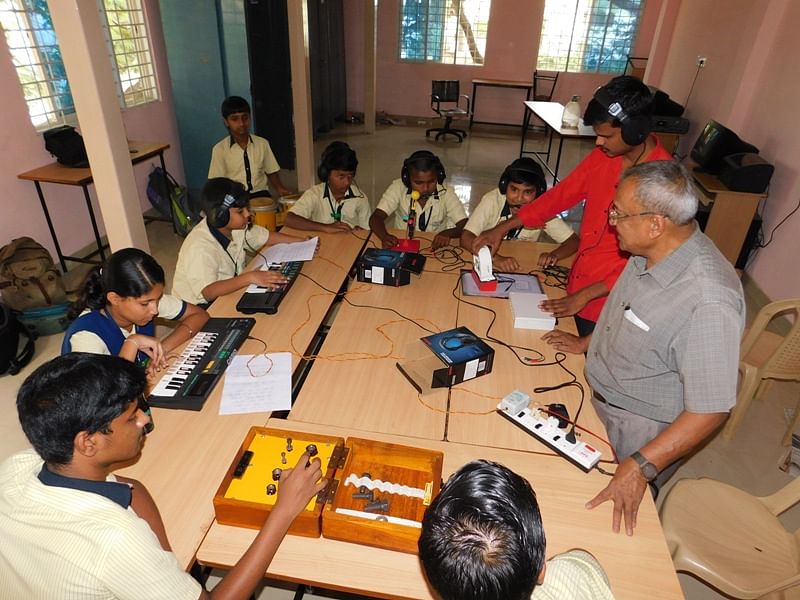
Samveda Training and Research Centre in Davanagere is better known as a school in the locality because it offers learning opportunities to the children with special needs. The objective of this organisation is to integrate the children with learning disabilities into the mainstream educational system and focus on their overall development.
In order to do that, it identifies their areas of interest and talents, and grooms them accordingly. Besides academics, there is an emphasis on their emotional and physical well-being.
How it came to be
The idea took shape nearly 30 years ago by Surendranath Nishanimut, an entrepreneur and a language trainer, who came across a child with learning disabilities and decided to help him by developing new learning techniques. During that time, he visited the All India Institute of Speech and Hearing (AIISH) at Manasagangotri in Mysore University and met the faculty to get a better understanding of the challenges faced by the special children. With the support of Dr Prakash P and Dr Jayaram he started training the children.
Eventually, he founded Samveda, which later expanded and was renamed as Samveda Training and Research Centre in 1994. Apart from research-based curriculum, the organisation focuses on modern technology to device new learning methods.
Its activities include rehabilitation of children through remedial teaching, special training and research on special needs education. It also caters to children with speech and learning disorders and specified categories of other health impairment (OHI). Students from various parts of the State come here to learn, and the number is increasing by the year. The organisation provides accommodation for only 20 students. The other students are here from 9 am to 5 pm. The organisation also offers vocational training.
“It’s important to diagnose the disability and start remedial measures when the child is young,” says Surendranath. Though Samveda remedial teaching model aims at improving the scholastic abilities of the child, it also stresses on the overall development. The team involves parents and other family members in the process to make it participatory and effective. Surendranath feels that better awareness among the parents will help both children and trainers, and ensure better results.
When a child is brought to Samveda, an initial screening takes place to identify the problem. Later, a complete assessment is done at AIISH. Once this is done, the parents are interviewed to assess their awareness and attitude regarding the rehabilitation of their ward. Then the organisation works with the child for three months before taking a decision.
Based on the information collected the organisation frames a plan for each child. It includes individual activity plan (IAP), individual medical plan (IMP) and individual education plan (IEP). IAP comprises physical exercises and sports, which help improve the child’s concentration, balance, multi-sensory coordination, fine motor skills, social behaviour, etc.
While Samveda encourages homoeopathy medicine, parents can inform about their preferences to the organisation. Strengths, Weaknesses, Opportunities and Threats (SWOT) analysis is also made when necessary.
All about self-reliance
The education plan is prepared based on the specific needs of a child. It includes remedial teaching for languages, mathematics and other concepts. The organisation has 16 teachers and 10 non-teaching staff. Only 55 children are accommodated in the school at a time.
“It generally takes three to four years for these kids to attain effective learning abilities. Then they are sent to mainstream schools. There are also instances when the training and rehabilitation period extends up to six to eight years,” says Shashikala, a teacher. Though there are no tests and grades at Samveda, the children are put in different levels based on their abilities. Vocational training and skill development helps them to be self-reliant when they grow up.
“I joined this organisation when I was in third standard. I had reading, writing and behavioural issues. My life changed after coming here. I finished SSLC last year and I am doing PUC now,” says Amrutha.
For more information about the centre, visit samveda.org.